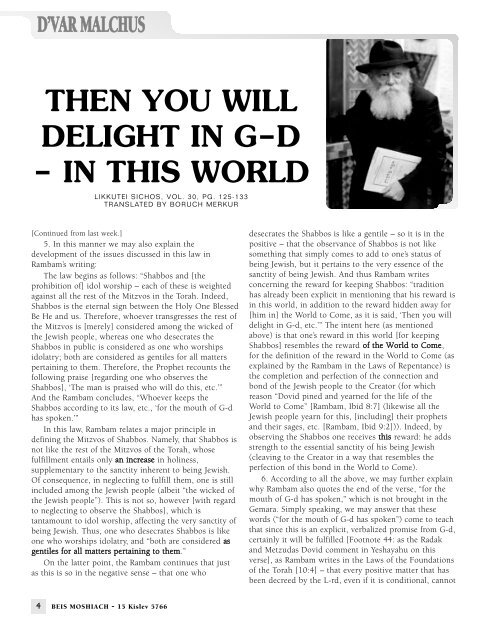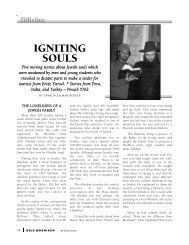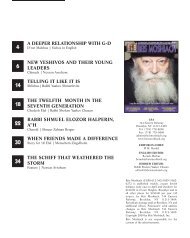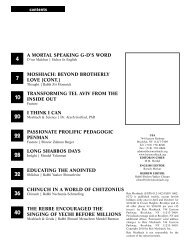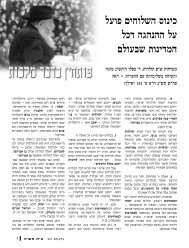You also want an ePaper? Increase the reach of your titles
YUMPU automatically turns print PDFs into web optimized ePapers that Google loves.
D’VAR MALCHUS<br />
THEN YOU WILL<br />
DELIGHT IN G-D<br />
- IN THIS WORLD<br />
[Continued from last week.]<br />
5. In this manner we may also explain <strong>the</strong><br />
development of <strong>the</strong> issues discussed in this law in<br />
Rambam’s writing:<br />
The law begins as follows: “Shabbos and [<strong>the</strong><br />
prohibition of] idol worship – each of <strong>the</strong>se is weighted<br />
against all <strong>the</strong> rest of <strong>the</strong> Mitzvos in <strong>the</strong> Torah. Indeed,<br />
Shabbos is <strong>the</strong> eternal sign between <strong>the</strong> Holy One Blessed<br />
Be He and us. Therefore, whoever transgresses <strong>the</strong> rest of<br />
<strong>the</strong> Mitzvos is [merely] considered among <strong>the</strong> wicked of<br />
<strong>the</strong> Jewish people, whereas one who desecrates <strong>the</strong><br />
Shabbos in public is considered as one who worships<br />
idolatry; both are considered as gentiles for all matters<br />
pertaining to <strong>the</strong>m. Therefore, <strong>the</strong> Prophet recounts <strong>the</strong><br />
following praise [regarding one who observes <strong>the</strong><br />
Shabbos], ‘The man is praised who will do this, etc.’”<br />
And <strong>the</strong> Rambam concludes, “Whoever keeps <strong>the</strong><br />
Shabbos according to its law, etc., ‘for <strong>the</strong> mouth of G-d<br />
has spoken.’”<br />
In this law, Rambam relates a major principle in<br />
defining <strong>the</strong> Mitzvos of Shabbos. Namely, that Shabbos is<br />
not like <strong>the</strong> rest of <strong>the</strong> Mitzvos of <strong>the</strong> Torah, whose<br />
fulfillment entails only an increase in holiness,<br />
supplementary to <strong>the</strong> sanctity inherent to being Jewish.<br />
Of consequence, in neglecting to fulfill <strong>the</strong>m, one is still<br />
included among <strong>the</strong> Jewish people (albeit “<strong>the</strong> wicked of<br />
<strong>the</strong> Jewish people”). This is not so, however [with regard<br />
to neglecting to observe <strong>the</strong> Shabbos], which is<br />
tantamount to idol worship, affecting <strong>the</strong> very sanctity of<br />
being Jewish. Thus, one who desecrates Shabbos is like<br />
one who worships idolatry, and “both are considered as<br />
gentiles for all matters pertaining to <strong>the</strong>m.”<br />
On <strong>the</strong> latter point, <strong>the</strong> Rambam continues that just<br />
as this is so in <strong>the</strong> negative sense – that one who<br />
4<br />
LIKKUTEI SICHOS, VOL. 30, PG. 125-133<br />
TRANSLATED BY BORUCH MERKUR<br />
BEIS MOSHIACH - 15 Kislev 5766<br />
desecrates <strong>the</strong> Shabbos is like a gentile – so it is in <strong>the</strong><br />
positive – that <strong>the</strong> observance of Shabbos is not like<br />
something that simply comes to add to one’s status of<br />
being Jewish, but it pertains to <strong>the</strong> very essence of <strong>the</strong><br />
sanctity of being Jewish. And thus Rambam writes<br />
concerning <strong>the</strong> reward for keeping Shabbos: “tradition<br />
has already been explicit in mentioning that his reward is<br />
in this world, in addition to <strong>the</strong> reward hidden away for<br />
[him in] <strong>the</strong> World to Come, as it is said, ‘Then you will<br />
delight in G-d, etc.’” The intent here (as mentioned<br />
above) is that one’s reward in this world [for keeping<br />
Shabbos] resembles <strong>the</strong> reward of <strong>the</strong> World to Come,<br />
for <strong>the</strong> definition of <strong>the</strong> reward in <strong>the</strong> World to Come (as<br />
explained by <strong>the</strong> Rambam in <strong>the</strong> Laws of Repentance) is<br />
<strong>the</strong> completion and perfection of <strong>the</strong> connection and<br />
bond of <strong>the</strong> Jewish people to <strong>the</strong> Creator (for which<br />
reason “Dovid pined and yearned for <strong>the</strong> life of <strong>the</strong><br />
World to Come” [Rambam, Ibid 8:7] (likewise all <strong>the</strong><br />
Jewish people yearn for this, [including] <strong>the</strong>ir prophets<br />
and <strong>the</strong>ir sages, etc. [Rambam, Ibid 9:2])). Indeed, by<br />
observing <strong>the</strong> Shabbos one receives this reward: he adds<br />
strength to <strong>the</strong> essential sanctity of his being Jewish<br />
(cleaving to <strong>the</strong> Creator in a way that resembles <strong>the</strong><br />
perfection of this bond in <strong>the</strong> World to Come).<br />
6. According to all <strong>the</strong> above, we may fur<strong>the</strong>r explain<br />
why Rambam also quotes <strong>the</strong> end of <strong>the</strong> verse, “for <strong>the</strong><br />
mouth of G-d has spoken,” which is not brought in <strong>the</strong><br />
Gemara. Simply speaking, we may answer that <strong>the</strong>se<br />
words (“for <strong>the</strong> mouth of G-d has spoken”) come to teach<br />
that since this is an explicit, verbalized promise from G-d,<br />
certainly it will be fulfilled [Footnote 44: as <strong>the</strong> Radak<br />
and Metzudas Dovid comment in Yeshayahu on this<br />
verse], as Rambam writes in <strong>the</strong> Laws of <strong>the</strong> Foundations<br />
of <strong>the</strong> Torah [10:4] – that every positive matter that has<br />
been decreed by <strong>the</strong> L-rd, even if it is conditional, cannot


